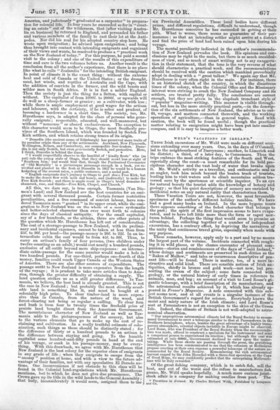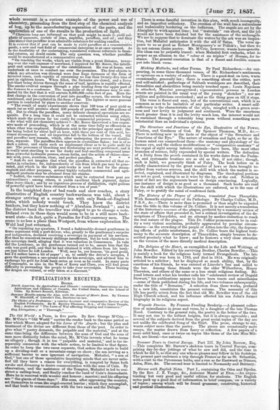WELD'S VACATIONS IN IRELAND. * TRESE Irish exeursions of Mr. Weld were made on different occa
sions extending over many years. One, in the days of O'Connell, led to the neighbourhood of Darrynane ; another, to Limerick and its district; a third, of a later day, to Connemara. Thus the trips embrace the most striking features of the South and West, especially along the coast—a coast remarkable for its bold precipitous character and the vast body of water that breaks upon it. Mr. Weld's activity as a traveller, and enthusiastic zeal as an angler, took him much beyond the beaten track of tourists, leading him to visit waters and to climb mountains seldom traversed save by the sportsman or scientific inquirer. To an eye for natural beauty the tourist adds the knowledge of botany and geology; so that his quiet descriptions of scenery are enriched by incidental notes on any natural rarity that characterizes them. These Vacation Tours are not, however, the most favourable specimens of the author's different holiday rambles. We have had a good many books on Ireland. In the more bygone tours.
there appears something of the faded character that belongs to the past; the spirit of the first impression seems to have evaporated, and to have left little more than the form or caput mortuum behind. Perhaps the thing that would seem to promise an advantage, the collecting together of a number of independent excursions has a contrary effect, by depriving the narratives of the unity excursions, continuous travel gives, especially when made with any purpose. These remarks, however, apply only to a part and by no means the largest part of the volume. Incidents connected with roughing it in wild places, or the chance encounter of pleasant companions—stories and reminiscences of the days of " ould Ireland," whose doings and sentiments are preserved in such ditties as the "Bakes of Mallow," and tales or occurrences descriptive of peasant life—will be found. There is matter, too, of a more instructive and solid kind. There are sensible notices of Irish antiquities' chiefly in bronze and gold work—not new, but presenting the cream of the subject; some facts connected with geology, or the natural history of early times in reference to animals, man, and bog; an account of a visit to Lord Rosse's gigantic telescope with a brief description of its manufacture and the astronomical results achieved by it, which has already appeared in Eraser's Magazine. A note connected with this subject seems new, and at all events is a singular instance of the British Government's regard for science. Everybody knows the moist and misty nature of the Irish climate ; and Lord ltosse's seat at Parsonstown is not an exception to the skies of the Green Isle. Indeed, the climate of Britain is not well-adapted to astronomical observation.
"Our unpropitious astronomical climate led the Royal Society to recommend Government to erect a telescope similar to that at Parsonstown in the Southern hemisphere, where, besides the great advantage of a highly transparent atmosphere, celestial objects invisible in Europe might be observed. L,ord Rosso, who was President of the Royal Society when the recommendation was made, offered to construct a speculum for the instrument and send a competent person to superintend its erection; but although the cost was estimated at only 60001., Government declined to enter upon the undertaking. While these sheets are passing through the press the gratifying intelligence has been communicated to me that the colonist: at Melbourne propose erecting at their own expense a powerful telescope of the nature recommended by the Royal Society. Remembering the rich astronomical harvest reaped by Sir John Herschel with a three-foot speculum at the Cape of Good Hope, we may confidently predict that the enterprising bielbournism will be duly rewarded."
Of the great fishing company, which is to catch fish, sell the
best, and out of the worst and the refuse to manufacture fish guano' Mr. Weld speaks hopefully. A much more curious jointstock affair is a company for making candles from peat. The • raeations in Ireland. By Charles Richard wow Published by Longman and Co.
Whole account is a curious example Of the power and use of chemistry, proceeding from the first step of the chemical analysis of bog, up to the manufacturing separation of the parts, and the application of one of the results to the production of light.
" Chemists long ago informed us that peat might be made to yield sulphate of ammonia, acetate of lime, naphtha, paraffine and oil ; and they also stated that paraffine hi an admirable substance for malting candles It is evident that if peat can be made to yield paraffine at a remunerative profit, a new and vast field of commercial enterprise is at once opened. As to the feasibility of the undertaking, considered without reference to financial returns, no doubt exists. The only question was, whether paraffine could be manufactured at a remunerative cost.
"On reaching the works, which are visible from a great distance, towering over the vast expanse of moorland, I inquired for Mr. Reece, the intelligent and scientific manager of the establishment. He was at home, and undertook at once to conduct me over the premises. The first objects to which my attention was directed were four huge furnaces of the form of inverted cones, each capable of consuming no less than twenty-five tons of peat in eighteen hours. When filled, the furnaces are dosed, and a fierce hot-blast being driven through the mass of turf, ignition is rapidly effected. The smoke evolved escapes through a pipe leading from the upper part of the furnace to a condenser. The magnitude of this condenser may be estimated by the fact that it will contain 8,000,000 cubic feet of gas. Here the first change in the conversion of peat into paraffine occurs, the smoke being condensed, and precipitated in the form of tar. The lighter or more gaseous portion is conducted by pipes to another reservoir. "The result of many experiments shows that 100 tons of peat yield as much tar as will produce about 350 pounds of paraffine and 300 gallons of oil. But to obtain the paraffine, many delicate chemical operations are regale' ite. For a long time it could not be extracted without using ether, which made the process far too costly for commercial purposes. At length —for what will not chemistry achieve ?—Mr. Reece discovered a less expensive mode of proceeding, which is at the same time fully as efficacious as when ether was employed. Sulphuric acid is the principal agent used : the tar being boiled for about half an hour, with three per cent of this acid, becomes decomposed, and all impurities fall to the bottom of the vessel. Oil and paraffine now remain, which, after undergoing the process of distillation, separate. The paraffine then appears in crystalline flakes ; but is of so dark a colour, and emits such an unpleasant odour as to be quite unfit for use. The processes of bleaching and deodorizing are next performed ; and it is really most startling to see the dusky and foul-smelling compound issue from powerful hydraulic presses, steam baths, and the action of chloro-ohn3
mic acid, pure, scentless, clear, and perfect paraffine, * * * •
Andi.do not imagine that when the paraffine is extracted all that remains la valueless for, independently of oils from Which gas may be generated, and which in the Irish peat-works is used as fuel for the steamen as and other purposes, several highly valuable commercial and agricultural products may be obtained from the residue.
" Indbed, the various substances which may be extracted from peat are extraordinary : among others, it yields excellent black pigment, darker than ivory-black ; and by an ingenious process of distillation, eight gallons of powerful spirit have been obtained from a ton of peat."
In the benighted days of bad roads and slow coaches, a story illustrative of English country backwardness was told, about a stranger arriving at a country inn with only Bank-of-England notes, which nobody would touch. They knew the district bankers, but they knew nothing of "Abraham Newland " ; and to the district bank the traveller was obliged to go to change a note. Ireland even in these days would seem to be in a still more backward state—in fact, quite a Paradise for Full-currency men. The scene is no less a place than Westport, from whose exploration Mr. Weld had just returned.
"On regaining my quarters, I found a fashionably-dressed gentleman in fierce argument with a pert driver, who, greatly to the gentleman's surprise and indignation, declined receiving a sovereign in payment of his services. Not that he conceived twenty shillings insufficient, but he took objection to the sovereign itself, alleging that it was valueless in Connemara. In vain did the Londoner, as the gentleman turned out to be, assure him that the coin was good gold, and that he had obtained it with others from his bankers just before he left London. Well, may be. yer honour, 'tis good geoid, but I'd rather have a bit of paper ' ; so, to satisfy the driver's scruples, I gave the gentleman a one-pound note for his sovereign, and advised him to exchange his gold for Irish bank-notes as soon as he could. In many parts of Connaught, as also in the West of Kerry and Clare, you will find great difficulty in persuading the people to take your sovereigns. Those bearing the dragon are refused, or only taken at a discount."



























 Previous page
Previous page